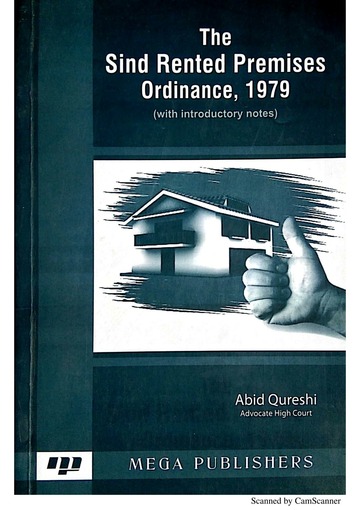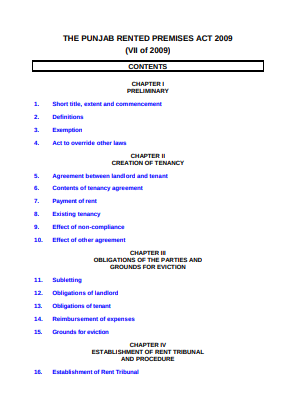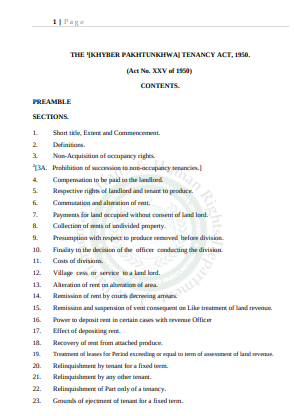Rent Law
Rent laws in Pakistan are designed to protect the interests of both landlords and tenants, ensuring a fair and regulated system for residential and commercial property rentals. These laws are governed by a mix of local legislation, national laws, and judicial interpretations, which have evolved over time. This article provides a detailed look at the rent laws in Pakistan, explaining the legal framework, recent changes, and the advantages they offer to both landlords and tenants.
What are Rent Laws? and What is it Application?
Rent laws are legal provisions that govern the rental agreements between landlords and tenants, covering aspects such as rental rates, security deposits, tenancy agreements, eviction procedures, and disputes. These laws aim to regulate the relationship between landlords and tenants to ensure fairness, avoid exploitation, and ensure a balanced approach to property leasing.
In Pakistan, rent laws are applied at the federal level but are also subject to provincial variations. This is because property matters are largely under provincial jurisdiction, and each province can enact its own rent laws. The framework generally includes rules about:
Rent control
Eviction and property possession
Rent increase
Tenant rights
Landlord rights
Dispute resolution mechanisms
Where are Rent Laws Applied?
Rent laws in Pakistan apply to both residential and commercial properties across the country. However, the specifics of the laws may differ depending on the province in which the property is located. The provinces of Sindh, Punjab, Khyber Pakhtunkhwa (KPK), and Balochistan have their own rent control laws, though they share many common principles.
Sindh: The Sindh Rented Premises Ordinance, 1979
Punjab: The Punjab Rented Premises Act, 2009
Khyber Pakhtunkhwa (KPK): The Khyber Pakhtunkhwa Tenancy Act, 1950
Balochistan: The Balochistan Rented Premises Ordinance, 1978
These laws govern rental transactions, specifying tenant rights and obligations, as well as landlord rights, providing mechanisms to resolve disputes between the two parties.
What is the Main Act and Ordinance Applied?
The main rent laws in Pakistan are:
The Sindh Rented Premises Ordinance, 1979
This ordinance is applied in Sindh province and is one of the most well-known legal frameworks regulating the rental market in Pakistan. It establishes the rights of both landlords and tenants and sets out specific rules about rent control, eviction procedures, and rental agreements.The Punjab Rented Premises Act, 2009
This act applies in Punjab and provides a clear legal framework for rental agreements, specifying the responsibilities of landlords and tenants. It also establishes the Rent Controller, who oversees disputes between the parties.The Khyber Pakhtunkhwa Tenancy Act, 1950
This act governs rental agreements in KPK and covers similar issues such as eviction, rent control, and tenant-landlord relationships. The act is focused on creating a fair balance between the rights of tenants and landlords.The Balochistan Rented Premises Ordinance, 1978
Balochistan has its own set of rent control laws that ensure tenants’ rights are protected, but they also allow landlords to make adjustments to rents based on market conditions.
Recent Changes to Rent Laws in Pakistan
Over the past decade, rent laws in Pakistan have undergone significant revisions to address modern housing and commercial trends. Some notable recent changes include:
Increase in Rent Control and Regulation
In urban areas where property rents have surged, rent control laws have become stricter. These changes ensure that landlords cannot arbitrarily increase rent beyond a certain percentage, and tenants are protected from sudden and extreme hikes.Eviction Process Reforms
The eviction process has been simplified and made more efficient. Historically, evicting a tenant could be a lengthy and complicated process, but recent reforms have streamlined eviction procedures to avoid abuse by either party.Rent Control for Commercial Properties
Commercial rental properties have increasingly come under rent control regulations, which were previously limited to residential areas. This ensures that businesses are not subject to exorbitant rent increases, which could disrupt their operations.Dispute Resolution Mechanisms
The establishment of Rent Control Authorities or Rent Tribunals has improved the speed and fairness of resolving disputes between landlords and tenants. These bodies are empowered to make binding decisions regarding rent disputes, security deposits, and eviction cases.Electronic Rent Agreements
In response to the digital transformation, several provinces have introduced provisions allowing rent agreements to be executed electronically, making the process faster, more transparent, and secure.
Advantages for Landlords
Protection Against Non-Payment
Rent laws provide mechanisms to protect landlords in cases of non-payment by tenants. In many provinces, landlords can take legal action to recover unpaid rent through the Rent Control Authority or the Rent Tribunal.Security of Income
With rent laws in place, landlords can rely on a consistent income stream from their property. Rent increase regulations often ensure that landlords can raise the rent periodically to keep up with inflation or market rates.Clear Eviction Process
The legal framework establishes a clear and structured process for eviction, which helps landlords regain possession of their property in cases of tenant default or lease violations.Legal Protection Against Tenant Damage
Rent laws also give landlords a legal recourse to recover the cost of damages caused by tenants. This includes both physical damage to the property and violations of the terms of the rental agreement.Rent Control and Stability
Rent control provisions in certain provinces protect landlords from having to deal with fluctuating rental income. These laws help stabilize rent rates in the long run.
Advantages for Tenants
Protection from Arbitrary Rent Increases
Rent control regulations ensure that tenants are not subjected to sudden or excessive rent increases, which can lead to unfair financial burdens. There are limits on how often and how much the rent can be increased.Tenant Rights and Security of Tenure
Rent laws protect tenants from arbitrary eviction. They can only be evicted under specific legal circumstances, such as failure to pay rent or violations of the rental agreement. In most cases, tenants are given adequate notice before eviction.Legal Recourse for Disputes
Tenants have access to Rent Control Authorities or Tribunals to settle disputes with landlords regarding rent increases, repairs, security deposits, or other issues. This gives tenants a clear legal pathway to resolve issues without resorting to informal or extrajudicial methods.Affordable Housing
Rent laws often include provisions that help ensure affordable housing by regulating rents and providing tenants with legal protections that prevent them from being forced out due to market-driven rent hikes.Maintenance and Repairs
Under the laws, tenants have the right to live in a safe and well-maintained environment. If a landlord fails to make necessary repairs or address safety concerns, tenants can request intervention from the Rent Control Authorities.
Conclusion
Rent laws in Pakistan play a vital role in maintaining a balance between the interests of landlords and tenants. While landlords benefit from increased security and income protection, tenants enjoy stability, legal protections, and affordable housing options. Recent changes to rent laws have sought to improve the fairness of the rental market, making it easier for both parties to resolve disputes and maintain transparent and fair agreements.
For both landlords and tenants, understanding the specifics of rent laws in their province is crucial to ensuring compliance and protecting their rights. With rent laws evolving in response to changing market conditions, it is essential for both parties to stay informed and adapt to these legal changes for a smooth and harmonious rental experience.

Hamza Alam
The Lex Blogger



